Nah, SITE-TF, the PRC is NOT Party Agnostic
An article inspired by Monday’s briefing on the People’s Republic of China WeChat election interference
“The Security and Intelligence Threats to Elections (SITE) Task Force (TF) has detected an information operation targeting the 45th General Election by Chinese social media platform WeChat’s most popular news account Youli-Youmian (有理儿有面), an anonymous blog that does not disclose its provenance.[i]Intelligence reporting links the Youli-Youmian account to the People’s Republic of China (PRC) Chinese Communist Party’s Central Political and Legal Affairs Commission (CPLAC).”
— SITE Task Force, April 7th, 2025
The SITE-TF Briefing
On Monday morning the government’s SITE-TF gave a 47 minute briefing on the latest development in China’s election interference. This incident involves WeChat, the popular Chinese social media platform and app, boasting upwards of 1.2 billion monthly users, one million of whom reside in Canada. In particular the incident involved Youlier-Youmian, one of the most popular accounts on WeChat, an account believed to have ties to the CCP.
The SITE-TF portrayed the PRC as party agnostic in its election interference and targeting of candidates. I call busllsh1t and I think many media representatives present took that claim with a grain of salt, also. I appreciate the efforts of the Rapid Response Mechanism (RRM) which the Liberal government has implemented to address the election interference and foreign interference (FI) that threaten our national security.
Overall though, I find the government’s response muted, weak, and grossly inadequate. I find the lack of action on this file tantamount to incompetence and negligence. It all leads me to question the legitimacy of the Liberal Party of Canada’s loyalty to Canada and Canadians. I question whether our government has become a patsy for Beijing.
Note that today, the CBC has done its usual obfuscation and distortion of important news information by describing the PRC’s endorsement of Carney as “targeting” and this simply adds to my perception of all things liberal government affiliated as in Beijing’s pocket.
Sam Cooper published one of the money maps from the Dotting the Map project today. Dotting the Map was launched by Canadian Friends of Hong Kong and Found in Translation. Below is Map 4, The Elite Capture. Please go and check out the Dotting the Map website, reader. Please spend time reading the information and studying the visuals and reflecting on what it means. This project represents a phenomenal amount of work and it represents what’s at stake for Canada, for Canadians.
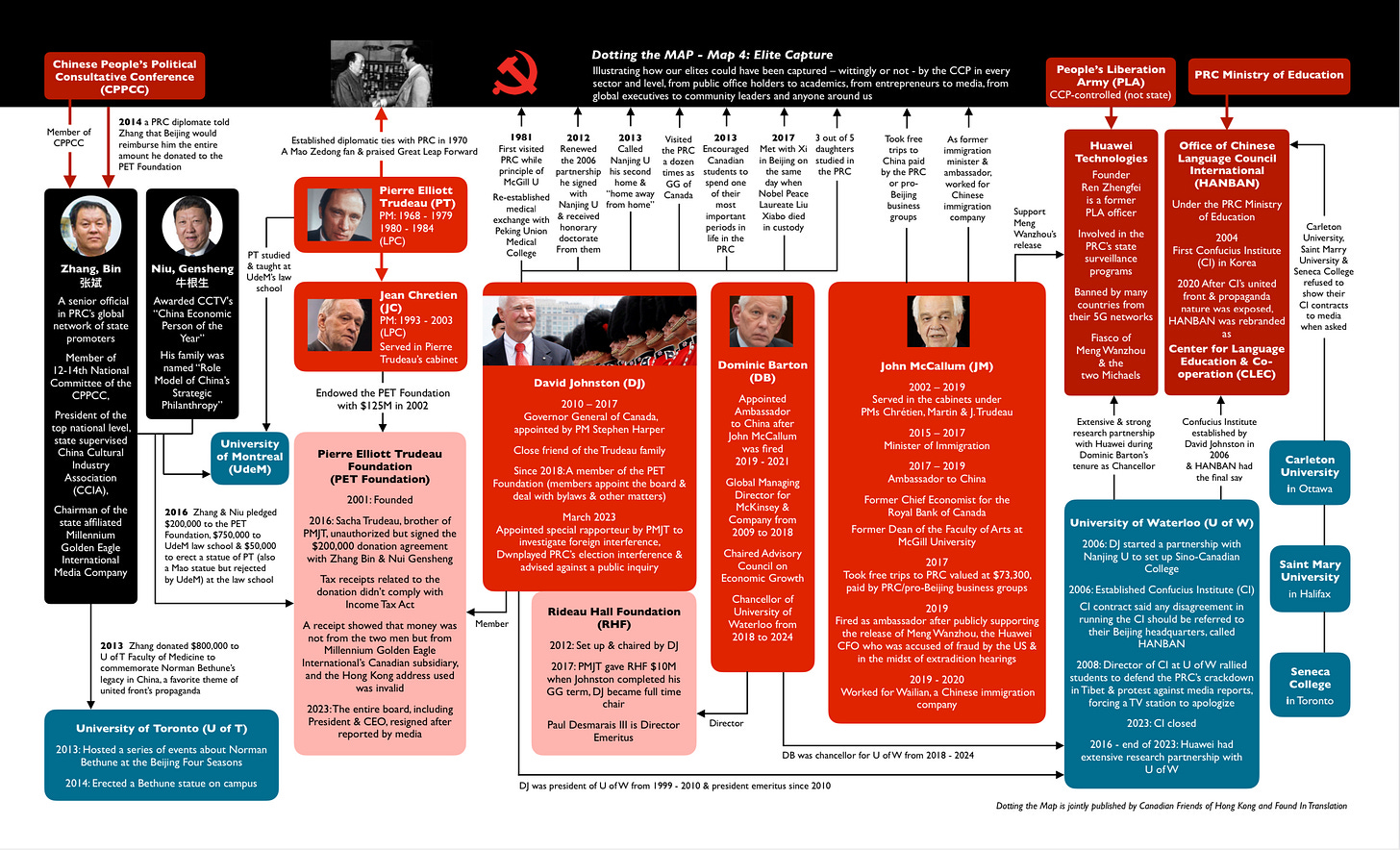
All that said, reader, I don’t for one moment buy the SITE-TF claim that the PRC is party agnostic in its current FI efforts. Beginning with Pierre Trudeau the Liberals have provided Beijing easy access to Canada, enabling the PRC to sew dissent and division amongst western allies. The inadequacy of the current Liberal government’s response to the obvious and growing dystopian influence exerted by Beijing within Canada, in the face of a growing and largely dismissed problem of transnational repression, leaves me quite cold.
So, with this missive, I have tried to elaborate on the concepts and issues that remain underreported in Canadian mainstream media. I begin by addressing the stuff mentioned in today’s briefing and then elaborate on the political infrastructure and mechanisms Beijing uses to deploy its information manipulation capabilities worldwide. In September of 2023 the Global Engagement Center of the US State Department published a report on the ways that the People’s Republic of China seeks to re-shape the global information environment. I’ve provided a copy for downloading below. Screenshots and excerpts of this report appear throughout this article, which hopefully will give you a better understanding of the challenges Canadians face and the threat the PRC regime poses to Canada’s national security. Hopefully, reader, you will also get a better understanding of the serious threats that the Chinese diaspora faces, particularly dissidents and human rights activists.

What’s Youlier-Youmian?
You can see for yourself, here is a link. Apparently Youlier Youmain means reason and face, and the moto is there is inside and there is a face. Maybe something is lost in the translation, idk, reader. Perhaps it refers to the statement there is inside and there is outside, referring to the gap between what’s contained and what lies outside the containment area.
Anyway.
Note there’s a discrepancy between the SITE-TF’s spelling and the spelling the Chinese media experts use. The SITE-TF uses Youli-Youmain, and Chinese media and related experts use Youlier Youmain. The Chinese script is the same in both cases. The bit of open source intelligence that positioned Youlier Youmain as a project of the Central Political and Legal Affairs Commission of the Communist Party of China (CPLAC) took me on down a rabbit hole, in which I encountered information on the mechanisms through which the PRC manipulates information globally for its strategic political objective, the driving one being the safeguarding of the CCP’s political monopoly on power.
Per Ginger River Review, Youlier Youmian (有理儿有面) is individual blog registered in 2019 with a primary focus on political commentaries [one blogger on Zhihu, the Chinese equivalent of Quora, claims that it is under the auspices of the Central Political and Legal Affairs Commission of the Communist Party of China …]. It features editorials on geopolitical shifts related to the Chinese government and society, such as the Russia-Ukraine conflict, the Taiwan question, and China-US relations. As an avid promoter of Chinese interests and values, it often reports the economic achievements and international presence of China with simple and engaging language, and offers its own suggestions as to the future track of development.
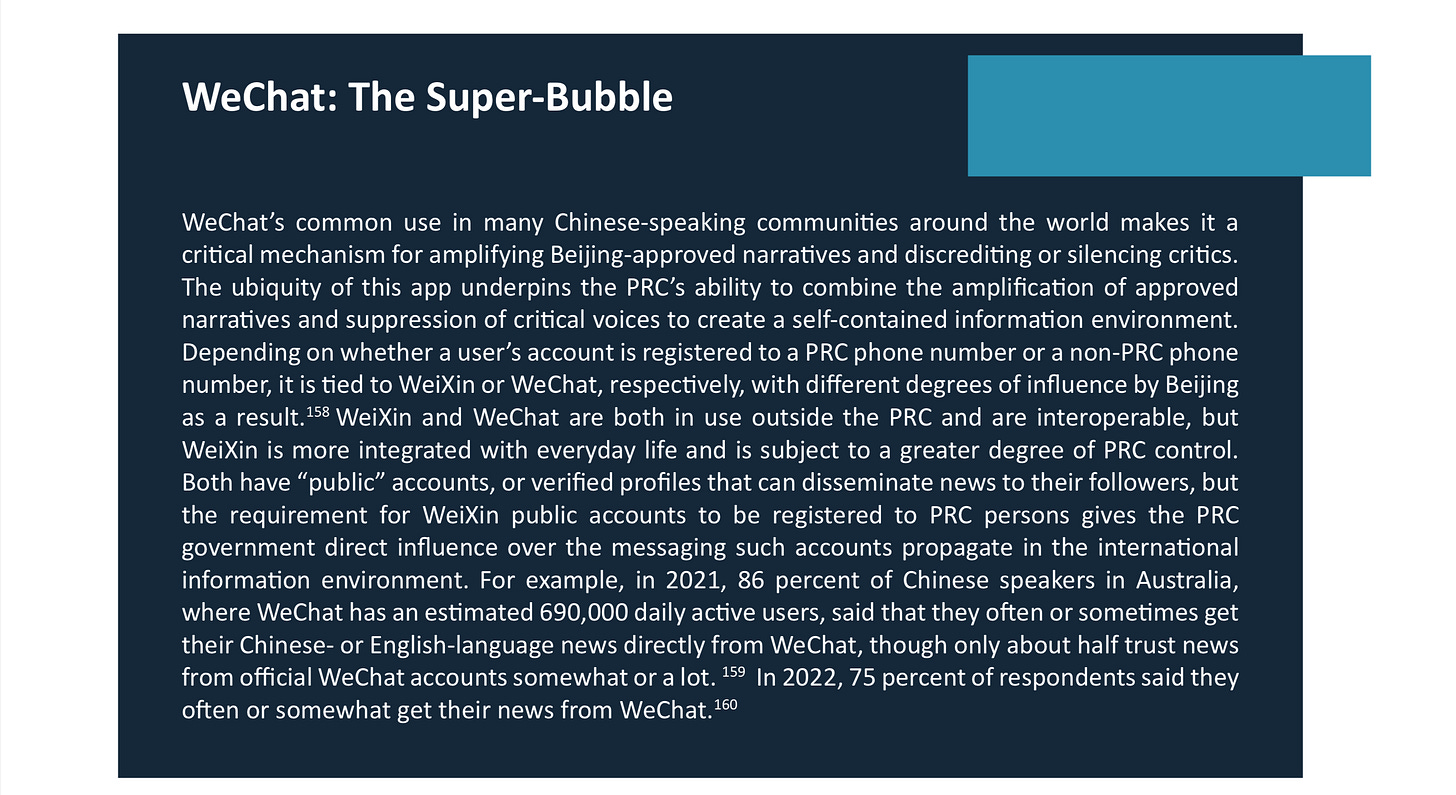
What’s the Chinese Communist Party’s Central Political and Legal Affairs Commission (CPLAC)?
To my outsider mind, the CPLAC seems like a kind of oversight organisation with a mandate to supervise and co-ordinate surveillance operations. It strikes me as the political behaviour of a highly insecure and paranoid governing party and regime. The CPLAC appears to operate in tandem with or through local “political-legal committees” (PLCs), which work in a coercive capacity to ensure the regime’s political security through judicial proceedings and a many other societal institutions.
Per China Leadership Monitor, (September 1st, 2021), the Central Political and Legal Affairs Commission (CPLAC) of the Chinese Communist Party (CCP) is among the most powerful organizations of the party-state. Its members include the heads of all domestic and national security agencies, the People’s Armed Police, and the presidents of the supreme court and procuratorate … The commission is responsible for … overseeing implementation of high-priority tasks, such as high-tech surveillance systems, new law-and-order initiatives, and crackdowns on dissent and potential organized opposition.
Most of … the CPLAC’S … current members are loyalists of General Secretary Xi Jinping, who counts the domestic security apparatus, along with the military and the party’s anti-corruption agency, as his base of power … Despite the power and role of the CPLAC in domestic security affairs, we know relatively little about this vital CCP organ because its work is shrouded in secrecy … close to 2.7 million officials and law enforcement personnel work in the “political-legal” sector, having undergone state-mandated “Education and Rectification”1 … The CPLAC, as well as the local political-legal committees (PLCs) that were established soon thereafter, now exercise oversight power over the entire political-legal sector … In 1999, the CCP established its infamous 610 Office to suppress the spiritual group, Falun Gong, and other cults. At the central level, this office was set up inside the CPLAC.
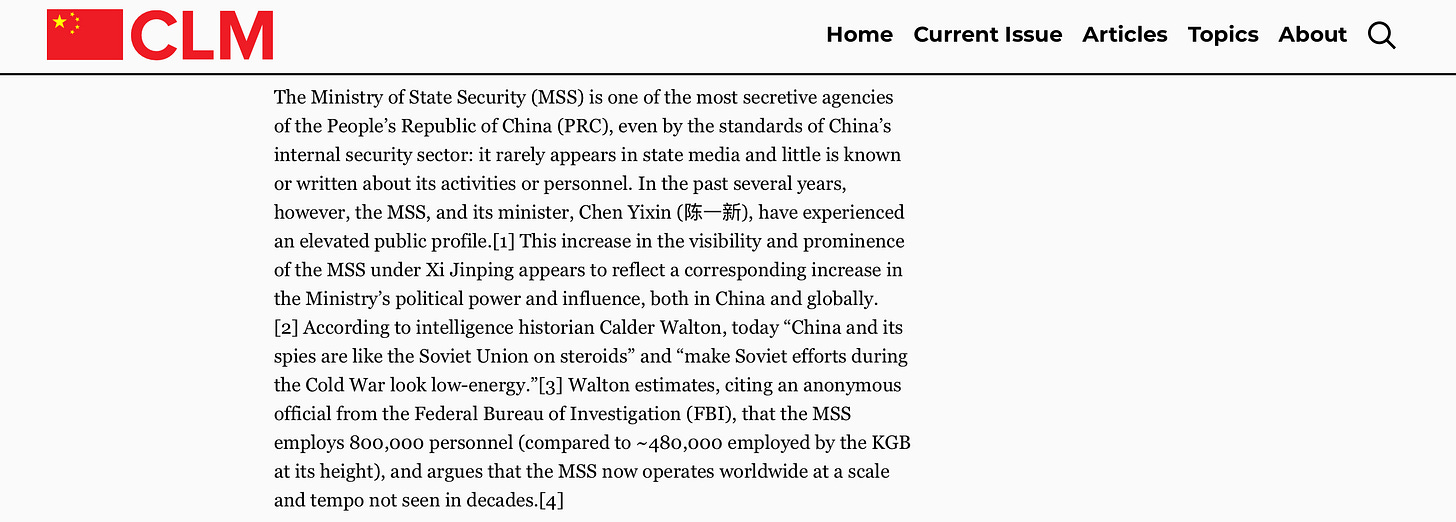
Unchecked, the PRC's efforts will reshape the global information landscape, creating biases and gaps that could even lead nations to make decisions that subordinate their economic and security interests to Beijing's. — GEC of the US State Department, 09.2023
What’s this all mean, though?
Reader, it means the PRC has a formidable surveillance and enforcement apparatus to protect the strategic political interests of the Chinese Communist Party, and to ensure Xi Jinping maintains a monopoly on power. It would seem this coercive control has extended beyond the borders of China, and into Canada. It would seem that Canada has a plague of some kinds of homegrown political-legal committees (PLCs) within the Chinese-Canadian community. I surmise this by surveying what looks like a severe degree of CCP infiltration of Toronto-area police forces.
As noted in the screenshot above, Th[e] increase in the visibility and prominence of the M[inistry of State Security] under Xi Jinping appears to reflect a corresponding increase in the Ministry’s political power and influence, both in China and globally. Clearly Canadians have felt that increase in power and influence on our own soil, within our own institutions, this extends to mundane matters such as public school board trustee appointments and municipal elections.
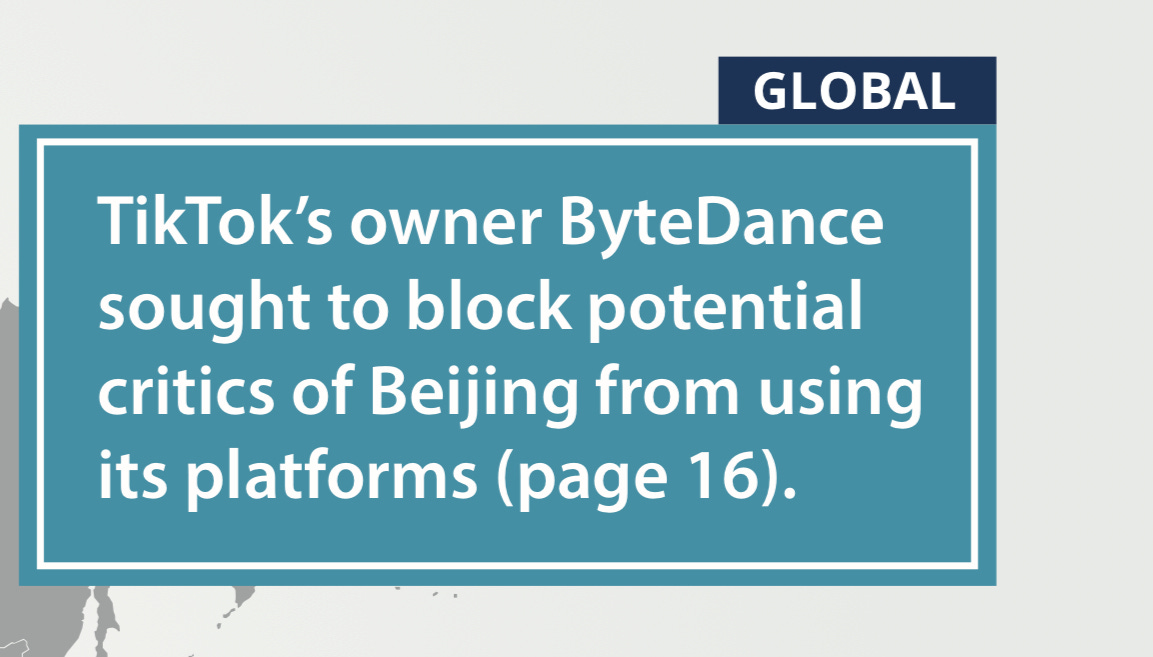
According to the US State Department’s 2023 report, the PRC employs a number of strategies to exert influence and promote Beijing’s political interests:
leveraging propaganda and censorship
promoting digital authoritarianism
exploiting international organizations and bilateral partnerships
pairing cooptation and pressure
exercising control of Chinese-language media
The US State Department reported two years ago that Beijing uses WeChat in reshaping narratives to suit its own interests, noting that Beijing exploits open societies such as Canada and the USA to suppress critical voices. On WeChat, an application used by many Chinese-speaking communities outside the PRC, Beijing has exercised technical censorship and harassed individual content producers. Notably, data harvested by PRC corporations operating overseas have enabled Beijing to fine-tune global censorship by targeting specific individuals and organizations. Countries adopting digital censorship policies that emulate China’s have over time cultivated a digital ecosystem more receptive to the PRC’s distorted narratives.
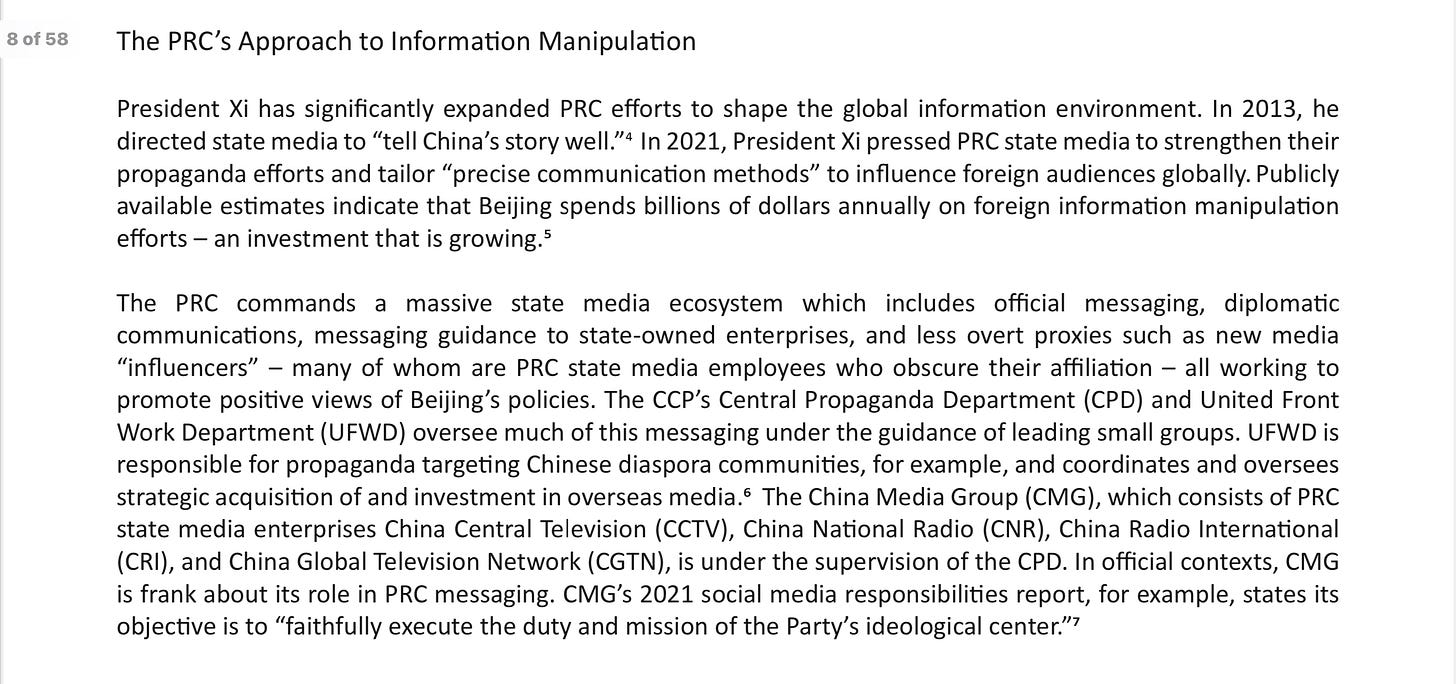
PRC diplomats frequently pressure host nations to adopt regime friendly narratives, they target media, academia, and even go so far as to intervene to try and cancel events that don’t align with or that upset Beijing’s strategic interests. The aim? To muddy and pollute the international news information ecosystem. The formidable data mining operations of the PRC enable Beijing to monitor the foreign information environment and deploy strategic mechanisms to manipulate the operation and control of global information to its advantage. For example, the use of AI technology to track Uighurs — trained AI models can recognise the Uighur language and facial phenotype. Also, the deployment of smart or safe cities facilitates mass surveillance. ByteDance, owner of TikTok keeps a list of those who pose a risk to the PRC by advocating for Uighurs.
In September 2022, according to U.S. Government information, a PRC state-owned electronics firm pitched to a state-level government in Nigeria a comprehensive “safe city” package that the company claimed would enable “preemptive enforcement of the Law.” According to sales materials, the state-owned firm offered systems that could, for example, enhance government control of the region by automatically comparing targets' faces and license plates to grey- and blacklists. Adopting these highly intrusive systems, the firm argued, would lead to higher economic growth, underscoring the link between the export of such systems and PRC support for normalizing the view that economic growth should take priority over individual rights. — GEC of the US State Department Global Engagement Center. 28.09.2023. Special Report: HOW THE PEOPLE’S REPUBLIC OF CHINA SEEKS TO RESHAPE THE GLOBAL INFORMATION ENVIRONMENT.
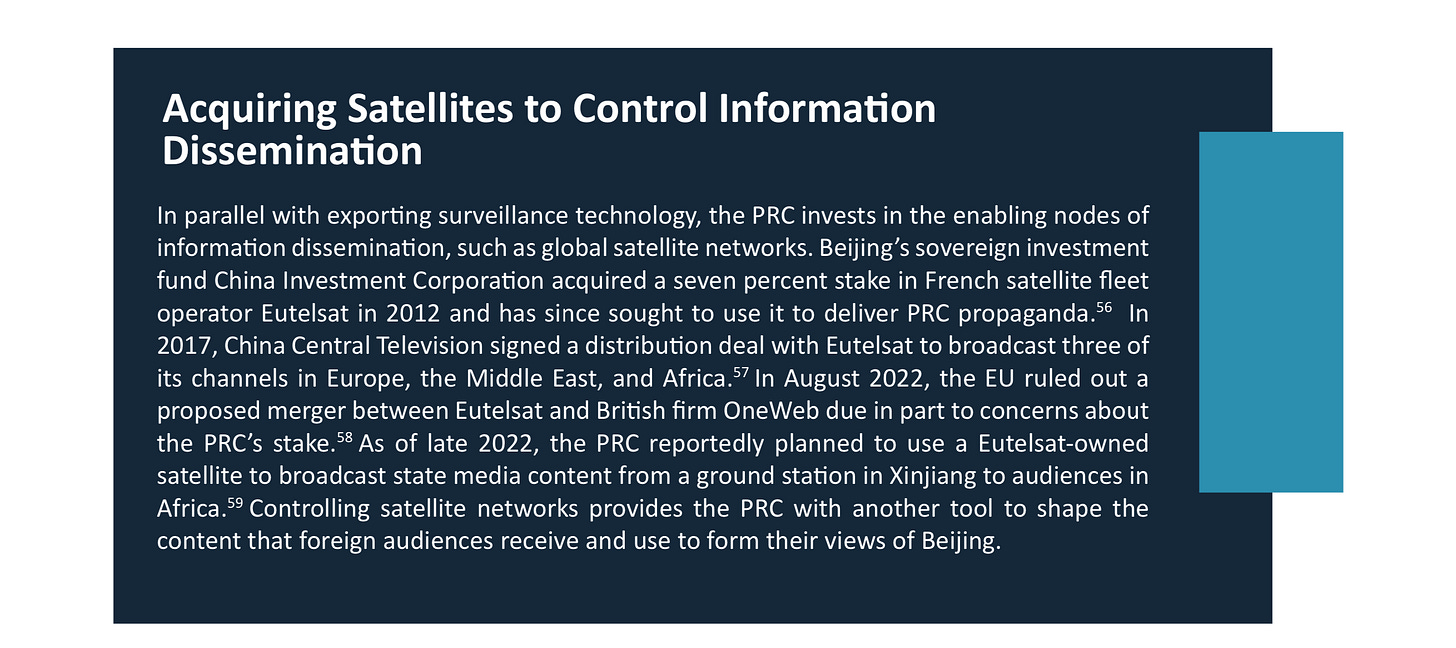
One important takeaway from the US State Department’s report for Canada’s policy makers should be that digital authoritarianism amplifies PRC information manipulation, and thus it increases the likelihood and effectiveness of transnational repression (TNR) perpetrated by the PRC and other hostile regimes, such as Iran.
Does the Liberal government’s draconian and authoritarian approach to “Online Harms” play into Beijing’s information manipulation and would it unwittingly make TNR easier?
That’s a question we all need to think about.
It’s a question that our lazy, incompetent, and weak mainstream media needs to ask themselves and the governments they exist to hold to account. The PRC's 2017 National Intelligence Law requires all organizations and citizens to “support, assist, and cooperate with national intelligence work” and to refrain from disclosing their cooperation with national authorities, writes the US State Department. Beijing routinely exploits diplomatic relations with host countries by using its diplomatic outposts to mine data on dissidents with a view to eradicating its designated “Five Poisons”.

Note Canadian readers — Sustainable Development Goals sounds a lot like Carney’s Net Zero schtick, doesn’t it? Anyway. As my more informed readers may have surmised, Beijing uses its influence in the UN to block human rights NGOs and suppress human rights posts and other things that don’t align with CCP values. The PRC has bribery of UN officials in its arsenal of strategic international politicking.

WeChat and WeiXin's popularity among Chinese speakers globally enables the PRC to censor overseas discussions. CitizenLab at the University of Toronto found that communications between registered WeChat users outside the PRC feed through "pervasive" surveillance that directly improves the PRC's domestic censorship capabilities by teaching WeiXin to recognize sensitive content more quickly. Within the closed WeChat ecosystem, PRC-based censors replicate the information controls that Beijing has imposed at home. According to Freedom House, PRC censors deleted a WeChat post by a Canadian Member of Parliament praising Hong Kong's Umbrella Movement, which advocated for increased autonomy for the special administrative region, and blocked coverage of corruption among PRC officials. (GEC of the US State Department, 09.2023)
According to the South China Morning Post, WeChat’s owner, Tencent, “has begun testing the integration of DeepSeek’s service on Weixin, [an exclusively mainland China app operated by Tencent that’s distinct from WeChat] … the operator of China’s most popular super app looks to artificial intelligence (AI) to power its suite of services.” Again, Canadians should stop and question Carney’s public statements praising the direction that Beijing has taken vis a vis AI. The communist panopticon is not your friend, reader! Buyer beware. The US State Department alleges that the PRC has created media persona as part of its elaborate global information manipulation campaign.
“The M[inistry of State Security] ‘executes the Chinese government's efforts to limit free speech, attack dissidents, and preserve the power of the Communist Party,’ according to a senior Federal Bureau of Investigation counterintelligence official.200 The MSS and UFWD have been observed collaborating at various levels both within the PRC and overseas to suppress and threaten critics of Beijing, indicating that UFWD is broadly involved in various forms of coercion by the PRC security and intelligence apparatus.” (GEC of US State Department, 09.2023)

I’ll end with something that may interest my Canadian readers. Around six years ago CBC’s Passionate Eye aired a documentary called Inside China’s Digital Gulag, and that documentary has sort of been scrubbed from the Passionate Eye website — of 38 different search results for Inside China’s Digital Gulag on the Passionate Eye site, 28 have been scrubbed. You can watch a trailer for this documentary on the CBC website and you can’t watch the entire video on CBC, though. In fact, I cannot seem to find anywhere online that shows the full length documentary. Not even PBS Frontline.
The documentary called Inside China’s Digital Gulag has simply vanished. Why, reader?





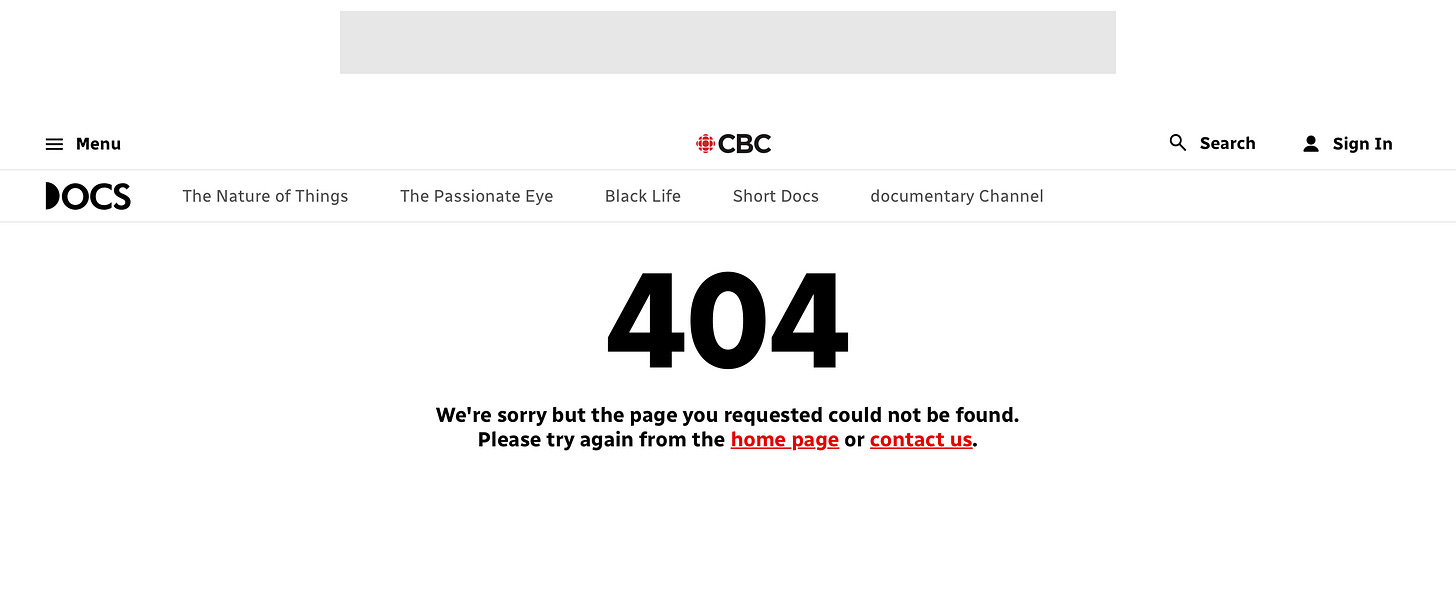
Ban WeChat